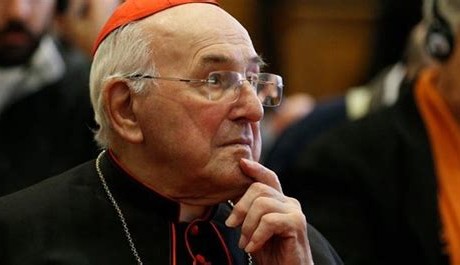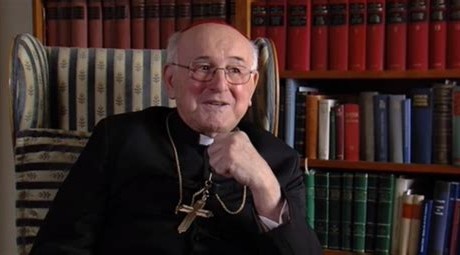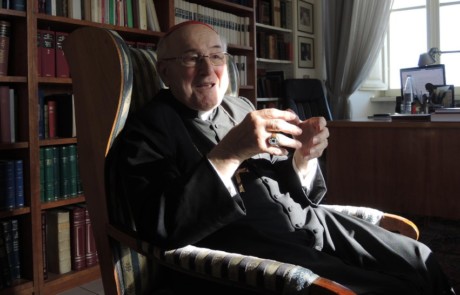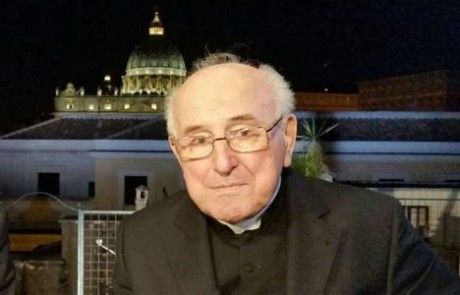Four images of Cardinal Walter Brandmüller, 92, in his book-filled cardinal’s apartment next to St. Peter’s Basilica, inside the Vatican, and in Rome (the bottom left photo).
Brandmüller has just written an important, thoughtful essay on the liturgy (see below).
***
Walter Brandmüller is a 92-year-old German cardinal, an eminent professor of history, and profoundly respected for his scholarly research over many decades.
He was for 11 years (1998-2009) President of the Pontifical Committee for Historical Sciences, making him, in a sense (in a sense) the leading Catholic historian in the world. (!)
It would not be too much to say that, thought he is now quite old at 92, Brandmüller remains among the most respected scholars in the College of Cardinals.
***
Pope Benedict had great esteem for Brandmüller, so he honored him by choosing to make him a cardinal on November 20, 2010. (Brandmüller was already past age 80, so he did not vote in the 2013 papal conclave.)
***
Brandmüller was born on January 5, 1929, in Ansbach, Germany.
His episcopal motto is “Ignem in Terram” which means (“(To cast) fire upon the Earth”) — the words Christ used to describe the purpose of his own mission in Luke’s Gospel, Chapter 12, Verses 49 to 53 (see below for the whole passage).
He was 10 years old when the Second World War began in 1939, and 16 when it ended in 1945. He was ordained a priest on July 26, 1953, at the age of 24, in Bamberg by Joseph Otto Kolb, Archbishop of Bamberg.
He did pastoral work in the church of St. John, Kronach, 1953–1957, and in that of St. Martin, Bamberg, 1957–1960. Thereafter he did further studies in Munich and served as Professor of Church History and Patrology at the University of Dillingen (1969-1971), and from 1971 until his retirement in 1997 he was Professor of Modern and Medieval Church History at the University of Augsburg, while also serving as parish priest of the Church of the Assumption, Walleshausen, Diocese of Augsburg.
A specialist in the history of Church Councils, he is founder and editor of the journal Annuarium conciliorum historiae (Paderborn, 1969); and of the series “Konziliengeschichte” (1979), which has published 37 volumes so far. From 1981 to 1998, he was a member of the Pontifical Committee for Historical Sciences.
So, he is a truly great scholar.
On 22 July 1990, he received the Cross of the Order of Merit of the Federal Republic of Germany from president Richard von Weizsäcker.
***
He has been a canon of the chapter of the St. Peter’s Basilica since 1997 (this means that he lives in Rome, inside Vatican City, just 20 steps from St. Peter’s Basilica, and is present for all the major ceremonies in the basilica. In fact, Brandmüller lives just a few steps from the Domus Santa Marta, and his apartment window looks out over the Domus, just a few steps away, where Pope Francis lives. Brandmüller can see the Pope’s apartment window from his own apartment window…)
In September 2016, Brandmüller, along with Cardinals Carlo Caffarra (now deceased), Raymond Burke and Joachim Meisner (now deceased) submitted to Pope Francis a private letter with five dubia (“doubts” or “questions”) seeking clarification on various points of doctrine in the Pope’s apostolic exhortation Amoris laetitia. (So, he is one of the two “dubia cardinals” still living.) The first dubium concerned the reception of the sacraments by the divorced and remarried; the other four asked about fundamental issues of the Christian life, and referenced Pope John Paul II‘s encyclical Veritatis splendor (which had been largely written by Cardinal Joseph Ratzinger). In November 2016, having not received a response, they publicized their letter, entitled “Seeking Clarity: A Plea to Untie the Knots in Amoris Laetitia.”
In May 2017, Caffarra, Brandmüller, Burke and Meisner sent a private letter dated April 25, 2017, and hand-delivered to the Pope on May 6, 2017, asking for an audience, having received no response to the dubia they had earlier sent him in September 2016. Having received no response, they made their letter public in June 2017. Two of the four died later that year: Meisner on 5 July; and Caffara on 6 September.
In February 2019, Brandmüller and Burke penned an open letter addressed to Pope Francis calling for an end of “the plague of the homosexual agenda,” which they blamed for the sexual abuse crisis engulfing the Catholic Church. They claimed the agenda was spread by “organized networks” protected by a “conspiracy of silence.”
After 10 years at the rank of cardinal deacon, he exercised his option to assume the rank of cardinal priest, which Pope Francis confirmed on May 3, 2021, just… two months ago…
Special note: A friend, Richard Duplantis, has a website where he sells beautiful liturgical supplies. I urge readers interested in such items to consider him: https://southernliturgicals.com/ — “Where art and beauty embrace the sacred.”
“But realize this, that in the last days difficult times will come. For men will be lovers of self, lovers of money, boastful, arrogant… holding to a form of godliness, although they have denied its power; avoid such people as these. For among them are those who slip into households and captivate weak women weighed down with sins, led on by various impulses, always learning and never able to come to the knowledge of the truth.” –2 Timothy 3:1–7
“And because iniquity shall abound, the love of many shall wax cold.” —Matthew 24:12
“Jesus said to his disciples: ‘I have come to cast fire on the earth [“ignem in terram,” the motto of Cardinal Brandmüller], and how I wish it were already blazing! There is a baptism with which I must be baptized, and how great is my anguish until it is accomplished! Do you think that I have come to establish peace on the earth? No, I tell you, but rather division. From now on a household of five will be divided, three against two and two against three; a father will be divided against his son and a son against his father, a mother against her daughter and a daughter against her mother, a mother-in-law against her daughter-in-law and a daughter-in-law against her mother-in-law.’” —Gospel of St. Luke (12:49-53)
Letter #74, 2021, Thursday, July 29: Cardinal Brandmüller on the liturgy
If you were to walk into Cardinal Walter Brandmüller‘s Vatican apartment to meet with him, you might think you were walking into a library, more than a home.
And you would not be far wrong.
For the good cardinal has an enormous library, filled with books in many languages, mostly about the history of the Church.
And he has read most of the books, digesting them like a good German scholar, until the history of the centuries is stored in his capacious mind, which travels backwards and forwards over the centuries with ease and familiarity, coming to rest in… our own time.
Today.
But his apartment is also very much a home, and the good cardinal is also a gracious host, making each guest feel at home in his library-like home.
Making each guest feel that this home is a type of sanctuary, dedicated to reason and learning, but also to faith, located as it is, strategically, just a few steps from St. Peter’s Basilica — and so, the tomb of St. Peter, the “Big Fisherman,” who still lies beneath Michelangelo’s great dome — and a few steps from the Domus Santa Marta, where Peter’s successor, Pope Francis, lives, and has lived for more than eight years now, since the spring of 2013, not even leaving in July and August, when Rome becomes a furnace and the Italians leave for the seaside or the mountains.
In fact, Brandmüller‘s apartment is almost exactly halfway between the Pope’s room in the Domus and the Basilica where Peter is buried.
And the good cardinal lives a quiet life here, in between Pope Francis and St. Peter, studying and reflecting and praying, and occasionally receiving an old friend, even a pilgrim, or a journalist… with cheerful, warm hospitality.
***
So what does our good cardinal Brandmüller, with all of his learning and wisdom and faith, have to say about the Pope’s latest decree, in which Francis seems to abrogate henceforth to the end of time, the old Mass, the Tridentine rite, which just a few short years ago Pope Benedict told us was something to be revered and considered… holy?
Essentially Brandmüller says, “Do not worry… Let nothing disturb you… stay calm… trust in God… wait patiently on the Lord… this too shall pass…”
So he speaks words of calm serenity amidst the general storm.
And perhaps these are words we all need to hear, now, as the state of the world, and of the Church — the state of viruses and vaccines, of trillionaire proponents of population control and gene-modifying technologies and genetically modified human beings, of Churchmen seemingly using cell phone apps to set up dates even from within Vatican City being exposed by intrepid journalists on an anti-corruption mission — seems sometimes overwhelming, filling many with a sense of fear and dread.
“Let nothing disturb you… trust in God…”
“Let nothing disturb you,
Let nothing frighten you,
All things are passing away:
God never changes.
Patience obtains all things
Whoever has God lacks nothing;
God alone suffices.”
“Christ has no body now, but yours.
No hands, no feet on earth, but yours.
Yours are the eyes through which
Christ looks compassion into the world.
Yours are the feet
with which Christ walks to do good.
Yours are the hands
with which Christ blesses the world.”
—St. Teresa of Avila (1515-1582)
Brandmüller on the Motu Proprio: “A law must be accepted to be valid”
July 29, 2021
Posted in Italian earlier today by Marco Tosatti
Based on a German original posted on Kath.net
Card. Walter Brandmüller, an eminent Church historian, has published this intervention on the motu proprio Traditionis Custodes [“Of Tradition the Guardians”] on Kath.net that we offer you in our Italian translation [now translated into English by myself—RM]. Enjoy the reading.
§§§
By Cardinal Walter Brandmüller
July 29, 2021
With his motu proprio Traditionis custodes, Pope Francis has practically unleashed a hurricane that has upset those Catholics who feel attached to the “Tridentine” rite of Mass revived by Benedict XVI‘s Summorum Pontificum [issued July 7, 2007].
From now on — according to the essential declaration of Traditionis custodes — Benedict’s Summorum Pontificum will be in large measure suspended and the celebration of Holy Mass, with some exceptions, will be allowed only according to the Missal of Paul VI.
A look at the blogger scene and other media outlets reveals how a global protest has erupted against this document, which is unusual in form and content.
In contrast to the protests relating to the content of the Traditionis custodes, it is necessary now to make some reflections here that refer to fundamental principles of ecclesiastical legislation — in regard to Traditionis custodes.
If the discussion about Traditionis custodes has so far concerned the legislative content of the motu proprio, here the text will be considered from a formal point of view as a legal text.
First of all, it should be noted that a law does not require special acceptance by the interested parties to acquire binding force.
However, it must be received by them.
Reception means affirmative acceptance of the law in the sense of “making it your own.”
Only then does the law acquire confirmation and permanence, as the “father” of canon law, Gratian († 1140), taught in his famous Decretum. Here is the original text:
“Leges instituuntur cum promulgantur. Firmantur cum moribus utentium approbantur. Sicut enim moribus utentium in contrariem nonnullae leges hodie abrogatae sunt, ita moribus utentium leges confirmantur ”(c. 3 D. 4).
(Our translation: “Laws are established when they are promulgated. They are confirmed when they are approved by the behavior of those who use them. For as due to the behaviors of users in an opposing direction [against the laws, not following the laws] quite a few laws today have been abrogated, so through the behaviors of the users the laws are confirmed”).
This means, however, that for a law to be valid and binding, it must be approved by those to whom it is addressed. Thus, on the other hand, some laws today are abolished by non-compliance, just as, on the contrary, the laws are confirmed by the fact that those concerned observe them.
In this context, reference can also be made to the possibility provided for by customary law, according to which a justified objection against a law of the universal Church has, at least initially, a suspensive effect [in other words, a law not received does not go into effect].
This means, however, that the law need not be obeyed until the objection has been clarified.
It should also be remembered that, if there is a doubt as to whether a law is binding, it is not binding.
Such doubts could be due, for example, to an inadequate wording of the law.
Here it becomes clear that the laws and the community for which the laws are enacted are linked to each other in an almost organic way, to the extent that the community’s bonum commune [“common good“] is their goal.
Put simply, this means that the validity of a law ultimately depends on the consent of those affected by it.
The law must serve the good of the community — and not vice versa, the community (serving) the law.
The two things are not opposed to one another, but linked one to the other, neither can exist without or against the other.
If a law is not observed, or is no longer observed, whether from the beginning or after a time, it loses its binding force and becomes obsolete.
This — and this must be strongly emphasized — naturally applies only to purely ecclesiastical laws, but in no case to those based on divine or natural law.
As an example of a lex mere ecclesiastica [“a merely ecclesiastical law”] consider the apostolic constitution Veterum sapientia [“Of the ancients the wisdom”] of Pope John XXIII of February 22, 1962, in which the Pope prescribed Latin for university teaching, among other things.
Young scholar that I was, I reacted only by shaking my head.
Well, Latin was the norm at the Gregorian University in Rome, and this made good enough sense given the babel of languages among the students, who came from all continents. But whether Cicero, Virgil and Lactantiuswould have understood the lessons [Note: given in a stumbling and fractured modern Latin], is doubtful. And then: the history of the Church, even of modern times, (taught) in Latin? With all the love professed for the Roman language — how could it work? [Note: In other words, Pope John ordered the classes to still be taught in Latin, but no one knew Latin well enough, so many simply did not obey the decree.]
And so it remained. Veterum sapientia was hardly printed and soon forgotten.
But what this inglorious demise of an apostolic constitution meant for the prestige of papal authority became evident only five years later, when Paul VI‘s encyclical Humanae vitae [in 1968] was nearly drowned amid protests from the Western world.
The thing is done, therefore, friends, and now, patience. Never has unenlightened zeal served peace, or the common good. It was St. John Henry Newman who, quoting the great Augustine, reminded us: “Securus iudicat orbis terrarum.” [“The verdict of the world is conclusive.” (link)] In the meantime, let’s pay close attention to our language. “Verbal disarmament” has already been called that. [In other words, in discussing this new law, do not resort to alarmed, abusive, “nuclear” language…”]
In more pious words: no violation of brotherly (and recently sisterly) love!
Now — seriously again: what a grotesque idea that the mystery of love itself [that is, the Mass, the Eucharist, the holt sacrifice of Christ] should become a bone of contention.
Again, we quote Saint Augustine, who called the Holy Eucharist the bond of love and peace that encloses [unites] the head and the members of the Church.
No greater triumph of hell could be imagined that if this bond [the bond uniting Christians in brotherly love] were broken again, as has happened many times in the past.
Then the onlooking world would grin: “Look how they love each other!”
[In other words, if the Church divides into competing factions, one hating the other, over this question, it would be the victory of Hell and the cause of amusement for the onlooking world.]
[End, Brandmüller on the legal bing power of the Pope’s decree]
***
Note to readers
Here is a link to an interview I gave on Tuesday, July 20, to Jim Hale of LifeSiteNews.
P.S. At the 36:49 mark we begin to talk about a pilgrimage to the Shenandoah Valley. You might take a look at those few seconds and consider whether you might like to join us toward the end of October when all the Valley is ablaze with the red, orange and gold of the changing leaves. (Click here for a link to the Information and Registration Packet).
“Be strong and take heart, all you who hope in the Lord.” – Psalm 31:24
The Shenandoah Valley Experience Pilgrimage
October 24 – 29, 2021
From the rolling waters of the Shenandoah River to the rich, orange sunsets of Shenandoah National Park in the Blue Ridge Mountains; from the bountiful farmland of this river valley to the many National Shrines in the area; we will encounter the beating heart of the Church and America today. Come to renew your soul, rest your mind, and ignite your heart.
Click the button below to view the itinerary and to see available booking options. Space is limited so don’t miss out!












Facebook Comments